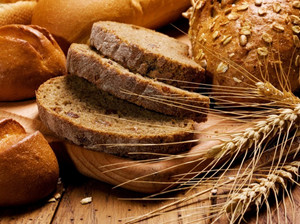One of the wonderful things about our liturgy is the fact that as we come together to worship each Sunday, we have continuity in the cycle of readings proclaimed and upon which we reflect. We have spent the majority of this year reading and reflecting on the "Cycle B" readings, the Gospel of Mark.
 Except, of course, over the last few weeks, when we have deviated from the regular cycle to take an extended look at some passages taken from the sixth chapter of the Gospel of John. The entire scene presented in these passages describes John's attempt to teach us the meaning and significance of the Eucharist - and traditionally, this section of John's Gospel is called the "Bread of Life Discourse".
Except, of course, over the last few weeks, when we have deviated from the regular cycle to take an extended look at some passages taken from the sixth chapter of the Gospel of John. The entire scene presented in these passages describes John's attempt to teach us the meaning and significance of the Eucharist - and traditionally, this section of John's Gospel is called the "Bread of Life Discourse".
Nowhere in John's Gospel do we find a narrative of the Institution of the Eucharist as we do in the other three Synoptic Gospels (Matthew 26:26-30, Mark 14:22-26, and Luke 22:14-20). There is no Last Supper scene - we do not read the words: "This is My Body... This is My Blood."
What John gives us instead is a sacramental look at our own lives, properly placed within the perspective of Christ's life - and His life within us. John shows us a Jesus who uses the language of our world to refer to the realities of His world. He gives us the time to meditate and think about what the Eucharist means in our own lives. And he allows us to place ourselves at the Table as one of Jesus' disciples, to watch and to listen to what He says.
At the beginning of the scene, we listened to the story of the miracle of the loaves and the fish. We watched as a young boy offered his few provisions to The Lord, who in turn used them to feed the multitudes. We see in this event that God's possibilities are greater than anything you or I could ever dream or imagine.
But there's more to the story. We heard Jesus speak of the great promise and the hope to which all of us cling: eternal life with God forever. Jesus makes a promise that some find hard to accept: "I am the living bread that came down from heaven; whoever eats this bread will live forever; and the bread that I will give is my flesh for the life of the world."
And this week we reflect on the closeness of Christ to us. Jesus explains to the disciples: "whoever eats my flesh and drinks my blood remains in me and I in him." Those hearing this had no doubt as to what Jesus meant, even though they had no heart to believe him. We too can ask in unbelief, "How can this man give us his flesh to eat?" Or we can listen in faith to the unspoken language of the Eucharist and in our hearts know it to be true.
In this week's passage of only seven lines, Jesus mentions the words live, life, and living, almost 10 times. He emphasizes that life - real life, eternal life - comes through him, through his body and blood.
There is a sense of intimacy here. Ours is not a distant, unapproachable God. Ours is a close and very personal God with whom we are called to share our lives.
We know that when we possess the life of God within ourselves, we are open to and make possible moments of wonderful grace - God's presence - moments when the unrelenting love of God is especially real to us. This is manifested in so many ways, in the many gifts of creation that encircle us, from the food that we put on our tables to the light of the sun that warms us; in the kindness and compassion of those who respond at special moments through acts of generosity and forgiveness that, though small and unheralded, transform the lives of those around us in peace and joy.
Eucharist is a sharing; it is a sharing of gifts at the table of the Lord, at the table of life. It is the situations of life that we experience, which enable us to truly see ourselves, to come to appreciate the gifts that we are, and the realization that happiness comes when we are able to take what we have been given and share this with others.
Like the boy with the loaves and fish, we come bringing our own paltry provisions; we offer them to the Lord who takes them and who provides our nourishment. But Jesus did not institute the Eucharist simply to change bread and wine into His Body and Blood. Much more than this, He transforms us into His Body and Blood. We become Eucharist for one another.
And like Peter (in next week's Gospel) we can profess: "Lord, we are convinced that you are the Holy One of God. We are staying with you because we know you have the words that will give us strength and courage, hope and peace: the words of eternal life."




